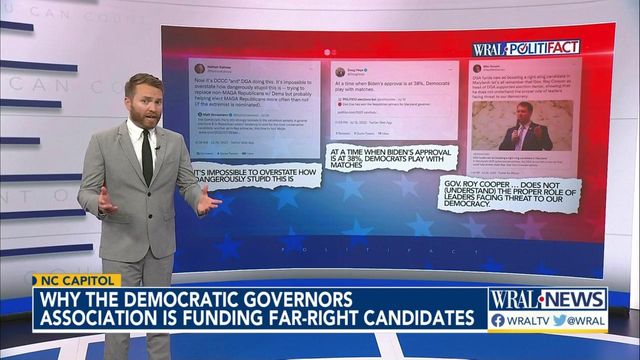Democratic group led by Cooper spends big to bolster far-right Republicans
The Democratic Governors Association is facing scrutiny from members of its own party for promoting far-right Republican candidates in states where gubernatorial races are expected to be particularly close.
Posted — UpdatedThe association, which is chaired by North Carolina Gov. Roy Cooper, is pumping millions of dollars into ads about these candidates in GOP primaries—including some that high-profile Republicans have heavily criticized for promoting falsehoods about the electoral process.
The DGA’s money is aimed at primary elections, but the group’s long game is focused on the general election. The thinking: Democratic candidates in swing states will become more electable if their Republican opponent is especially controversial.
Tennessee state Rep. Mike Stewart, a Democrat and former state party caucus chair, called the strategy inappropriate and shortsighted, adding that the DGA should apologize for amplifying election deniers and putting them in a position where they could potentially gain power.
“Governor Cooper should be ashamed of himself,” Stewart told WRAL News. “He should announce that he made a huge mistake.”
“It's very important that prominent leaders emphasize the importance of democracy over any particular party for any particular strategic objective,” Stewart added.
The DGA’s strategy is informed by research, approved by its leaders and executed by staff, said David Turner, the group’s communications director. “Our leadership is involved in ensuring our overall strategy across 36 races is sound,” Turner said.
When asked about the approach this week, Cooper declined to discuss his role as DGA chairman in how the group spends its money or the thought process behind elevating controversial Republicans. He instead talked about how the money largely goes to elevating Democrats and getting out the party message heading into November.
“The DGA is investing its funds in getting Democratic governors elected across the country, mostly concerned on its incumbents to make sure that they are elected. They want to make sure that they educate the public about issues that they're going to face in about 100 days when November comes around,” Cooper told reporters Tuesday after a Council of State meeting.
The DGA’s tactics confuse some on the other side of the aisle, too. Doug Heye, a North Carolinian and former spokesman for the Republican National Committee, said Democrats are “playing with matches” at a time when Biden's approval rating is low. He thinks the DGA’s plan to promote more extremist views contradicts the party’s other efforts at stifling dangerous speech.
“If you truly believe that these are insane conspiracy theorists election deniers, anti-woman, anti-gay, anti-minority and everything else … you've now elevated all of that to a place where it has more credence,” Heye said.
Critics fear the strategy, which has been deployed by other Democratic groups, could backfire and lead to a repeat of Trump–who was once deemed too controversial to be elected president—until he was.
Nathan Kalmoe, a political science professor at Louisiana State University, called the efforts “dangerously stupid,” saying that it could actually cause moderates to run on a more conservative platform and ride a wave of Democratic-fueled ads.
“Even aside from the voting implications, it is a big disincentive for non-MAGA Republicans to stay non-MAGA,” Kalmoe tweeted on July 26, referring to Republicans who echo Trump’s “make America great again” battle cry and repeat conspiracy theories that the election was stolen from him. “And the non-MAGA faction needs to win within the [Republican] party to avoid the most disastrous outcomes we're facing as a country.”
Lis Smith, a former adviser to Pete Buttigieg—the U.S. transportation secretary who ran for the Democratic presidential nomination in 2020—said it was risky but that the Democratic group wouldn’t be culpable for the candidates’ success.
Turner, the DGA spokesman, rejected the idea that the group was solely responsible for the success of controversial candidates.
“We have been clear,” he said. “We are [starting] the general election early in a number of states because we believed the front runner was going to be the eventual nominee.
“Any notion we were boosting Republicans is wrong,” he said. “Educating the public on the MAGA extremism, and cowardice, of today's Republican party is essential to ensuring all citizens have the facts. It's time for the GOP to look in the mirror and have a reckoning with itself, instead of trying to find someone else to blame.”
Ultimately, he said, it’s the GOP primary voters who are electing flawed candidates to run in races where they’ll need support from outside the party.
“Republicans continue to drive off the cliff and nominate more and more candidates who are on the fringe of their own party, which are about 175 degrees away from your average voter,” Jackson said.
• Credits
Copyright 2024 by Capitol Broadcasting Company. All rights reserved. This material may not be published, broadcast, rewritten or redistributed.





